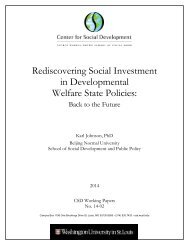Exploring and Assessing Intercultural Competence - Center for ...
Exploring and Assessing Intercultural Competence - Center for ...
Exploring and Assessing Intercultural Competence - Center for ...
Create successful ePaper yourself
Turn your PDF publications into a flip-book with our unique Google optimized e-Paper software.
(FEMV4+I)<br />
- more awareness of differences<br />
- more open-minded<br />
- helped her on many different levels<br />
- changed attitude<br />
- will be a helpful person throughout life<br />
(FEMV5+I)<br />
- will try to help poor people in her own country<br />
- a changed person<br />
- will want more different experiences<br />
- more aware of own values<br />
Summary<br />
<strong>Exploring</strong> <strong>and</strong> <strong>Assessing</strong> <strong>Intercultural</strong> <strong>Competence</strong><br />
It is clear that mentors felt that volunteers were impacted in many positive ways – in areas of<br />
knowledge, attitudes, skills, <strong>and</strong> awareness – <strong>and</strong> they noted how volunteers had changed,<br />
expected volunteers to pursue their life choices more effectively, <strong>and</strong> to be helpful to others.<br />
The mentors also appreciated the contributions of volunteer to their projects:<br />
- the volunteers stay <strong>for</strong> short periods of time<br />
- experience with volunteers is excellent<br />
- have low budget <strong>and</strong> can’t hire adequate staff<br />
- volunteers are a great help<br />
Given low budgets <strong>and</strong> inadequate staff, volunteers provided much needed assistance. The<br />
mentors’ only complaint was the short duration; but, all in all, they were “a great help.”<br />
E. The Mentors<br />
Finally, what about the host mentors involved in this study? Did interaction with <strong>for</strong>eigners also<br />
affect their lives <strong>and</strong> work in any way? The impact of intercultural contact on those who never<br />
leave home is seldom part of research <strong>and</strong> it is examined here. Of 5 supervising mentors, 3<br />
completed survey <strong>for</strong>ms about themselves at the beginning of contact with the volunteers, 4<br />
completed <strong>for</strong>ms at the end, <strong>and</strong> 4 were interviewed in person at program end. This summary<br />
explores the impact of this experience upon the Ecuadorian counterparts.<br />
About the Mentors/Self (MS)<br />
The following in<strong>for</strong>mation was summarized from Part I of the survey <strong>for</strong>m:<br />
- all 4 mentors were female<br />
- their ages were 35, 43, 55; 1 did not answer this question<br />
- all were Ecuadorian monolingual Spanish-speakers<br />
- 3 were college graduates <strong>and</strong> 1 held a doctoral degree<br />
- they worked in civic service <strong>for</strong> 3, 12, 15, <strong>and</strong> 25 years<br />
- 3 had never been outside of Ecuador, 1 in Bolivia<br />
<strong>Center</strong> <strong>for</strong> Social Development<br />
Washington University in St. Louis<br />
53
















